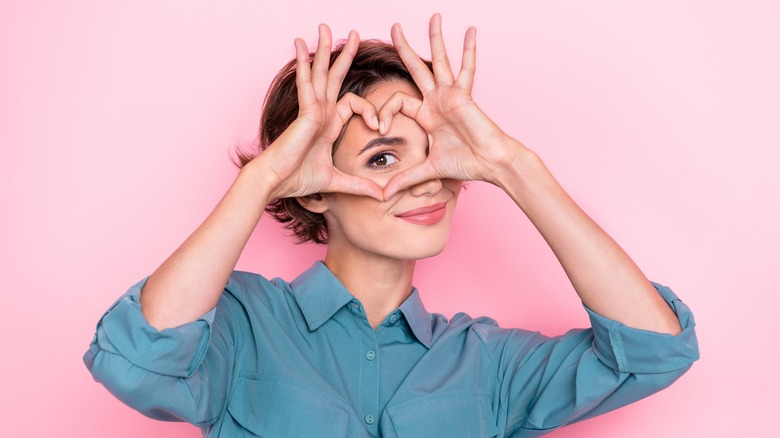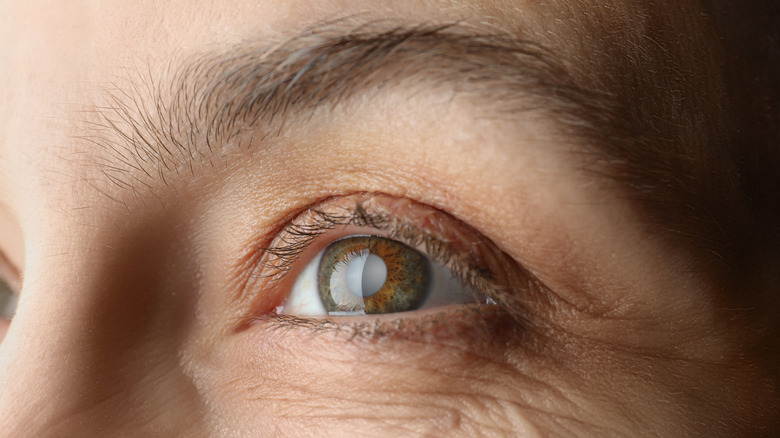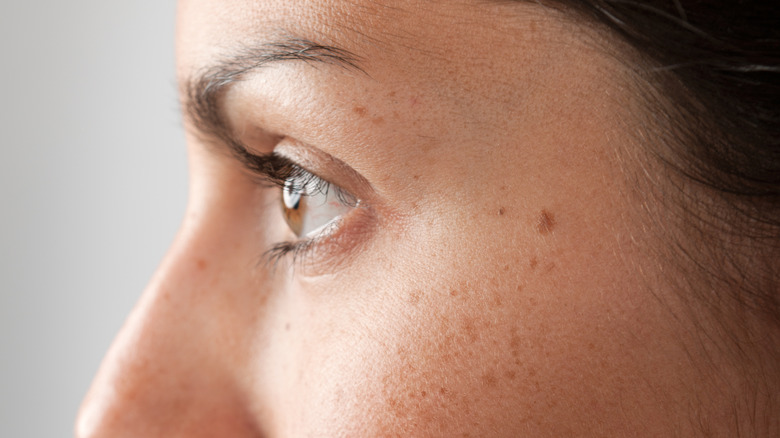Your Eye Color Means Way More Than You Realize - Here's Why
"The eyes are the windows to the soul" took on a new meaning when scientist Ian Kent proposed that the color of a person's eyes could provide insight into their personality. The psychiatrist instigated quite the controversy as the proposition seemed entirely anti-empirical. To other scientists in the 1950s, it was incredulous to suggest that the link between physiology and psychology could extend so far.
In the decades since, our understanding of the mind, body, and soul, and how they intersect, has grown drastically. As our tools to probe these facets of humanity develop and advance, more researchers have explored Kent's original idea. Since the 1950s, we have compiled a lot of evidence that, in fact, eye color may reveal more about an individual than we ever could have presumed. Here are some interesting associations that researchers have found between eye color and other body characteristics as well as human personality traits.
Your eye color could indicate how reflexive you are
In 1974, Morgan Worthy found that dark-eyed birds react more quickly than light-eyed birds in the face of an emergency. Extrapolating from this, a team of researchers compared individuals with brown eyes to those with blue eyes on a task assessing their reflexes. They evaluated the participants' reaction time and abilities to make decisions quickly when faced with different choices. In experiments, brown-eyed subjects responded faster than blue-eyed subjects. This was true regardless of whether the individuals were presented with visual or auditory stimuli. The team suggested that this could mean that people with different eye colors potentially have different mechanisms with which they process their surroundings, though science has yet to examine those particulars.
These findings have been replicated in a 1978 study. Perhaps, brown-eyed individuals simply are quicker at responding to situations than their lighter-eyed counterparts. If you have light eyes, though, don't fret. The differences are small and wouldn't be noticeable in real-life emergencies.
Your eye color could reflect your risk for high blood pressure
High blood pressure, or hypertension, is one of the biggest predictors of developing heart and lung disease. More interestingly, science reveals that your eye color could be associated with your risk for elevated blood pressure issues.
People with brown eyes are one-and-a-half times as likely to develop hypertension than people with lighter-colored eyes, according to a 1990 study. This remains true even after you account for other factors like body mass index, alcohol use, and family history of high blood pressure. In fact, if you are a twin with brown eyes and your counterpart has blue or green eyes, you are still one-and-a-half times more likely to have high blood pressure later in life — pretty convincing evidence in favor of the correlation between eye color and blood pressure.
Researchers argue that we still have a long way to go before we can use eye color to measure one's risk for developing the condition, but the link suggests that melanin may play a role in metabolism.
Certain eye colors are more at risk of developing cataracts
A cataract is a condition that develops in the lens of your eye – the part of your eye that focuses light. In individuals with cataracts, a "cloud" forms in the lens which can cause vision to be blurred, colors to appear faded, or overall trouble seeing. Many older individuals are prone to developing cataracts as their eye proteins age and break down, but some things can accelerate the development of cataracts. Injuries to the eye and sun exposure can damage the eye's proteins prematurely. There may even be a link between eye color and the development of cataracts.
A 2000 study discovered that dark brown-eyed individuals have a higher chance of developing certain types of cataracts than their lighter-eyed counterparts. This may have something to do with how light is filtered through different iris pigmentations. Researchers recommended that people with dark brown eyes be extra cautious while in the sun, using hats or sunglasses to prevent direct sunlight exposure. Theoretically, however, we should all take precautions to protect against UV rays.
Eye color may indicate how competitive you are
Have you ever noticed that there is a markedly wider range of hair and eye colors in northern Europe when compared to other areas of the world? Strange, given how other geographical locations of the same density don't display the same extent of diversity. Anthropologists believe this may be indicative of mating competition between males in the past.
Mating is a complex phenomenon linked to many personality traits. One of the traits mating is linked with is competitiveness. Due to mating competition in the past, evolutionary biologists believe that individuals with the most dominant eye color in northern Europe may be descended from individuals who were more likely to succeed in mating competitions — the more competitive groups.
We also know that personality traits are also hereditary between families. There is research to corroborate this. Combining these two facets of knowledge, researchers looked at whether there was a link between eye color and competitiveness. The researchers found that those with lighter-colored eyes, the dominant eye color in northern Europe, are more competitive than their darker-eyed counterparts, confirming their hypothesis.
Eye color could predict risk for alcohol abuse
The color of your eyes could provide insight into your drinking habits. A 2001 study found that individuals with lighter-pigmented eyes are more likely to consume heavy amounts of alcohol than individuals with darkly-pigmented eyes. Researchers have hypothesized that this is because people with darker eyes may be more sensitive to alcohol. They may have more adverse reactions to alcohol, which would preclude them from drinking heavily.
Since darker-eyed individuals may be less likely to drink in large amounts, they may also be protected from developing alcohol dependence, since dependence requires heavy consumption. As such, people with blue, green, or gray eyes may be at higher risk for developing addictions to alcohol.
This could even be true for other drugs. It has been shown that light-eyed people are less responsive to other medicating substances, making them more prone to overconsumption. Having said that, these correlating links don't indicate causation. More important than eye color is a mindful approach to your drinking habits.
Children with certain eye colors may be more responsive to certain behavioral therapies
Some personality differences correlated with eye color start presenting as early as childhood. Researchers discovered that dark-eyed children are more responsive to reactive treatment programs than self-paced programs.
What does this mean? Reactive programs require participants to respond and react to stimuli as they change quickly. Remember how we said that brown-eyed individuals show faster reaction times to situations? This appears to start in childhood. Meanwhile, light-eyed children perform better in self-paced activities. These are tasks where children can choose when and how to start an activity of their own accord, regardless of background stimuli. This could suggest that your eye color may indicate traits like intrinsic motivation and self-control.
Whether these differences speak to larger differences in personality or in adulthood is yet to be understood, though the scientists believe this could have implications for how to apply behavioral therapies amongst children with different eye colors.
Your eye color could indicate how internet-savvy you are
How good is your knowledge of internet fun facts? If you feel confident in your trivia abilities, chances are you have blue or hazel eyes. Researchers in Canada found that people with blue and hazel eyes knew more about the Internet than people with gray and brown eyes (without controlling for some outside factors).
Could this mean that blue and hazel-eyed people are spending more time scrolling through Twitter and TikTok? Not necessarily. The link between eye color and internet knowledge was much less pronounced once you accounted for factors like socioeconomic status and language. However, given that there seem to be many links between eye pigmentation and perception of information, more research into this area is warranted. For now, it may be worth grabbing a blue- or hazel-eyed friend for Tuesday Night Trivia if the topic is the World Wide Web.
Eye color could predict risk of melanoma
Cancers are affiliated with a variety of risk factors. Surprisingly, eye color can be added to the list, based on a 2001 study.
People with blue or gray eyes are at an increased risk of developing ocular melanoma, a type of eye cancer. This could be attributed to the protective effect of melanin, a dark pigment that serves to protect individuals from UV damage. People with darker eye colors tend to have more melanin all around, so the association may actually be between melanin and cancer risk, with darker eye pigmentation being a sign of higher melanin levels. Research doubles down on this when we account for the fact that brown-eyed individuals are less likely to develop iris melanoma.
While we know that eye color may be associated with increased risks of these diseases, there are many other factors at play and many behaviors we can engage in to protect ourselves and our health. Sunglasses, sunscreen, and a balanced diet can do more to decrease our chances of cancer than our eye color likely can.








